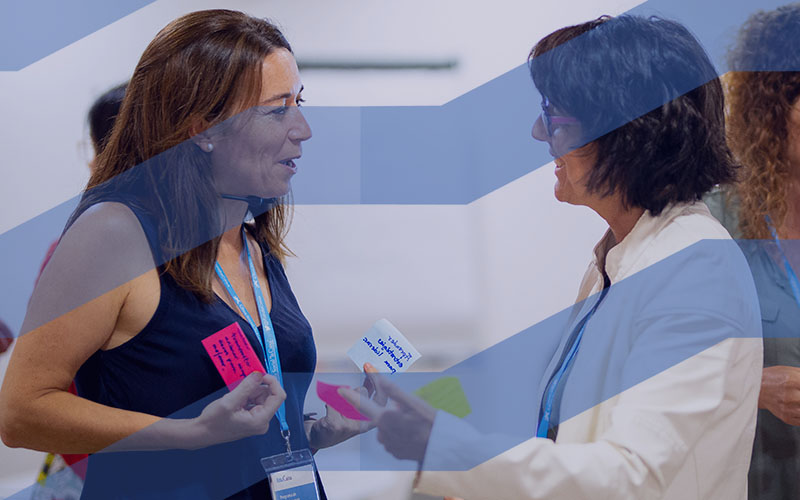School leadership is a very different job in Spain. Could sharing IOE know-how still make an impact?
Greg Ross, leader of international educational leadership programmes at the IOE, wanted to find out.

22 December 2021
As a world-leading centre for teacher education, IOE research and researchers are influencing outcomes at schools all over the world.
Leaders, all the research tells us, are vital to schools. They influence everything from culture to pedagogical practices. Their impact on student outcomes is second only to the impact which teachers have in their classrooms – and their potential for improving a school is vast.
Which is why a new IOE programme, run in partnership with the La Caixa Foundation, which aims to build a better, fairer society through funding programmes and social, educational, cultural and scientific initiatives, has focused on the impact leadership could have in Spanish schools.
In Spain, the role of headteacher has been administrative rather than learning focused. Heads are usually elected by staff and serve a four-year term, and are responsible for the day-to-day running of the school. They typically don’t take on responsibility for leading curriculum, teaching and learning or staff professional learning – although this is beginning to change, with headteachers in some regions now serving longer terms with greater autonomy.
Our new programme aims to contribute to this change. It encourages headteachers to be learning-focused leaders and to develop a teaching and learning vision for their schools. And it draws on the UCL Centre for Educational Leadership’s international reputation and vast experience of delivering professional development for tens of thousands of school leaders across England over the past ten years.
“Our programmes are based on research but are very different from densely theoretical academic programmes, and the Foundation could see how relevant that would be,” says Greg Ross, Associate Professor (teaching) and programme leader of international educational leadership programmes.
Ross and his team spent ten days in different regions of Spain learning from heads, academics, inspectors and teachers from a variety of schools. The IOE and La Caixa teams then brought together a Spanish advisory board that included school leaders, policymakers and academic evaluation specialists, to guide the creation of a programme that took in themes including leading learning organisations, leading innovation, leading teams and learning about leadership.
The programme takes place across a year and is delivered by a group of 14 Spanish co-facilitators alongside the IOE team. “We are aware that we are coming at this with a very different set of experiences and contexts,” says Ross. “We wanted to be working alongside credible, serving Spanish school leaders. That reflects our approach in England, where we bring in serving school leaders to our professional development programmes.”
The whole programme is delivered in Spain, with an emphasis on the reality of participants’ context and experiences. Between each of the programme phases, participants meet in regionally organised learning groups of six to eight peers, facilitated by members of the Spanish programme team. The groups use a peer-coaching model to support each other in their school improvement focuses. Many from the first cohort are still meeting now, after the programme has finished.
Sessions are underpinned with critical reflection that allows participants to connect theory and practice. Each participant must undertake a leadership project that runs across the programme, helping to cement this connection. “They identify a priority for improvement in their school. Then they are supported in strategically planning, delivering and then evaluating the impacts of their work,” says Ross. “For example, they might choose to improve attendance in schools with higher proportions of economically disadvantaged students, to improve inclusion of students with special educational needs, or develop an aspect of the school curriculum.”
The first cohort of a planned six has just finished, so evaluation of its overall effectiveness isn’t yet possible. However, feedback from participants has been extremely positive: almost half now take evidence-informed approaches to school leadership, for example.
Ross is interested in how these self-sustaining peer-to-peer learning networks might contain learning for future programmes. “Participants tell us this model has had a powerful impact on them.” And while this programme is specific to Spain, it could provide a model for a new approach to leadership development across systems. This approach is collaborative and draws on expertise from different parts of the system that the programme is delivered in, as well as the external expertise that the IOE can provide.
“It’s also an approach that is not driven by policymakers within national government – it’s bottom-up,” points out Ross. “It doesn’t just influence participants but could also have influence nationally – in this case, shifting from the administrative model of school leadership into something more learning focused.
“This kind of collaborative professional development and knowledge exchange – translating research to programmes – can have a very wide impact, both nationally and internationally. It’s intrinsically connected to the values that drive our work: social justice, equity and a sense of moral purpose.”
 Close
Close


